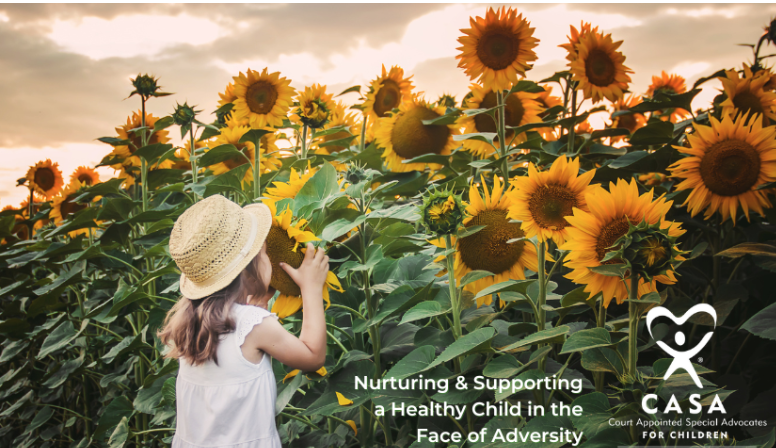
There are several requirements children need in order to flourish:
-
Security
Children should feel safe and sound, with their basic survival needs met: shelter, food, clothing, medical care and protection from harm. This is not only from their family but also the child’s community, school, programs, friends and in these cases their CASA.
-
Stability
Stability usually comes from family and community. Ideally, a family remains together in a stable household, but when that’s not possible, it’s important to disrupt the child’s life as little as possible. When children are placed in foster care a CASA is appointed to the case to be a stable, consistent adult in the child’s life and throughout the court process.
-
Consistency
Parents are normally the stability for the child. When this is not the case, foster parents and CASA’s can help provide the consistency a child needs, and this relationship allows them to build trust with adults. CASA may be the one consistent adult in a child’s life.
-
Emotional Support
Words and actions should encourage children’s trust, respect, self-esteem and, ultimately, independence. CASA’s step in where necessary and act as the supportive figure that will listen and help the child work through their feelings if expressed.
-
Love
Children need affection and love. Knowing that adults in their lives are caring and loving is beneficial for their emotional growth. Some CASA’s who have been a part of a child’s life can become life-long trusted confidants and many times continue to keep in touch with children once out of the program. This life-long support is invaluable for children who do not feel love and support from family members.
-
Education
It is imperative to help children to get the best education possible for a bright future. This includes school, of course, but it also includes the invaluable life lessons provided throughout childhood and adolescence. School can be extremely challenging for children in the foster care system. They may have to change schools, make new friends, and have to adjust to a new environment on top of many other challenges.
Partners for our Children published a report stating, “Students involved in the foster care system comprise a diverse and vulnerable group of learners with complex educational needs. Experiencing child maltreatment and instability generate and intensify academic struggles. Lack of school stability often undermines the potential for school to function as a location to access supportive resources and relationships crucial to healthy psychosocial and academic development.”
-
Positive Role Models
Parents are their children’s first and most important role models. With the absence of parents, children often learn boundaries, values, and empathy from those they are around. Foster parents, babysitters, teachers, and CASA’s are all figures that can provide a positive role model. Ensuring the adults around the child instill values and teach children empathy is critical.
-
Structure
Rules, boundaries, and limits: Without them, children and adolescents are forced to be adults before they are ready, and they lose respect for adults and other authority figures. Structure can be defined and set by family, foster parents and CASA’s to help create a guided and supportive vision for the future.
Depriving children of adequate relationships and support can generate adverse childhood experiences which creates stress and affects the child’s ability to properly react and develop. Working together to support the most vulnerable within our community should be a priority.
Goochland CASA is looking for more volunteers to help support children who need it through the foster care system. A CASA can truly “Change a Child’s Story” and create an environment that is supportive, structured, secure while providing emotional support, love and care. Find out how you can be a part of nurturing and supporting a healthy child today! www.goochlandcasa.org
#BacktoSchool #ChangeAChildsStory